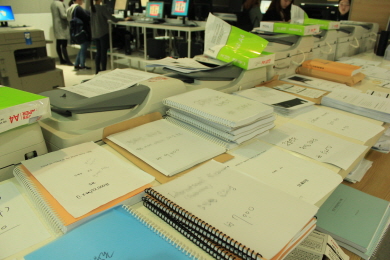
Kim Hee-jeong (alias), a sophomore of Ewha Womans University, decided to photocopy class textbooks instead of purchasing them this semester. After attending a year of college, she realized that books “required” for classes are not actually used during the course. In fact, classes were mostly taught using PowerPoint presentations and online data.
“All those expensive books I bought last year are covered with dust on my bookshelf,” Kim said. “Therefore, I found it unnecessary to buy new books and opted to make photocopies with the intention of tossing them away after taking the course.”
Photocopying more than a tenth of a book is considered to be copyright infringement by the Korea Federation of Copyright Organization. However, Hee-jeong is just one of the many students who fill up the bindery at the beginning of the semester to photocopy textbooks. In March, binderies on campus are filled with students like Kim who want to photocopy textbooks at a fraction of the original price.
Consequently, to protect publishers’ copyrights, the Ministry of Culture, Sports and Tourism has cracked down on illegal textbook photocopying from March 1 to 30 this year. As of March 23, the ministry’s investigators have found a total of 17,205 illegal textbook copies at 257 copy shops near universities. The number of confiscated copies has drastically increased from 12,739 to 15,474, and further on to 16,335 in year 2013, 2014, and 2015 respectively. Considering that the investigation is continuing at the moment, illegal photocopying is expected to increase this year.
Despite the yearly crackdown on textbook piracy, students continue to resort to illegal photocopying due to economic reasons. While foreign textbooks can cost well over 100,000 won, copy stores on campus offer photocopies at around 50 won per page.
“I saved around 10,000 won per textbook by photocopying them,” Kim said. “Although the amount does not seem much, I do not regret my decision since most textbooks are rarely used in class.”
In order to alleviate students’ financial burden from having to buy expensive textbooks, some universities and professors have devised legal methods to help students save money on them.
For example, Seoul Women’s University introduced the Class Textbook Rental Service on March 11. The school’s library purchased enough books for all students taking the 20 selected courses during the spring semester. The service will enable students to check out class textbooks at the library and return them at the end of the semester. After a year of trial period, the library will deliberate on whether to continue the service.
“We decided to initiate the service to ease students’ stress from buying expensive textbooks,” said Oum Seong-yong, the director of the Seoul Women’s University library. “The service is also expected to decrease the number of students using illegal textbooks.”
In the case of Youngdong University, it has provided free textbooks to 10 students from each department since 2013. The school has granted a maximum of three books to students with short-budgets. With the system, students can purchase any book used in their major-related classes as long as it costs less than 60,000 won.
“The subsidy compensates for the high tuition fees,” said Hur Seong-jin, a library staff at Youngdong University. “The service is extremely popular among students, and the university is struggling to meet the high demands.”
Not only universities but also professors nationwide have sought solutions to high textbook expenses by publishing free textbooks for students. In 2010, 48 professors nationwide initiated the Big Book Movement to deal with the cost of university textbooks and unequal access to information. Led by professor Cho Young-bok of Pusan National University, the professors gave up the copyright of their works, providing online textbooks and e-books in areas such as humanities, social sciences and engineering.
Currently, the Big Book movement’s goal is to diversify its storage of information. It plans to add video clips, dissertations and newspaper articles to the existing 100 college e-books offered on the Big Book website. From 2017, the movement aims to upgrade the e-books to the IST, an Interactive Smart Textbook. The IST is expected to help students communicate directly with the professors of the textbooks for a more in-depth learning.

